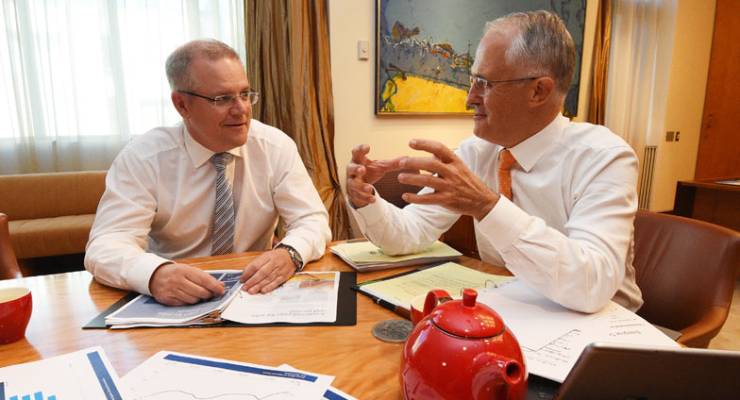
The government has caved in to a right-wing backbench rebellion on superannuation, but secured offsetting savings that will improve the budget bottom line, in the first major improvement to Australia’s deeply flawed superannuation tax system since Labor tried to amend the system in 2013.
The changes to superannuation taxation were announced in the budget but immediately became controversial with Malcolm Turnbull and Scott Morrison’s internal opponents, particularly on the issue of a $500,000 cap on concessionally taxed additional contributions, which was backdated to 2007. Labor, which had put forward its own superannuation savings measures in 2015, opposed the retrospectivity of the cap.
During the election campaign, Turnbull was adamant that there would be no changes despite backbench criticism, saying in early June, “as I’ve made it clear, there will be no changes to the policy. It’s set out in the budget and that is the government’s policy” and demanding internal critics “get real” about how high-income earners were abusing the retirement incomes taxation system. The government also denied the backdating amounted to retrospectivity.
With his authority badly damaged by the narrow election win, Turnbull had to back down, with Treasurer Scott Morrison negotiating with the right-wing of his party to address the retrospectivity, but demanded offsetting savings. The negotiations became a flashpoint in Tony Abbott’s campaign to undermine his successor when Abbott confronted Morrison at a private meeting reported by The Australian.
But today’s deal appears to have provided a win for both sides. The $500,000 cap has been abandoned and replaced with a new lifetime cap for both concessional and non-concessional contributions of $1.6 million (indexed), with a $100,000 annual limit — although there’s a bring-forward option of up to three years. To offset the half-billion lost in revenue from dumping the $500,000 cap, the government is also removing a proposed change that would have allowed people in the transition-to-retirement phase greater freedom to make additional contributions. It is also delaying changes that would give people with disrupted work patterns greater freedom to contribute — Labor had proposed to eliminate those changes altogether and been attacked by Morrison for the suggestion. According to the Treasurer, the whole package means the budget bottom line will be better off by $180 million over the Forward Estimates.
The government’s backdown is undoubtedly a win for the very rich, who have been exploiting Australia’s retirement incomes system for tax avoidance and estate planning purposes for many years. They will still have the capacity to enjoy concessional tax treatment that they would not have enjoyed under the original Budget proposal. The people paying for that via the offsetting measures include high income earners, but also Australians on middle incomes with disrupted work patterns, including parents who take time off for child-rearing. The package agreed is less fair than the one in the budget.
But, overall, this is an important step forward in getting our retirement incomes system back on track at a time when it is heading toward a cost of over $20 billion a year in lost revenue. It will also make that system less unfair by decreasing — though certainly not eliminating — the opportunities for high income earners to rort the system. In that context, regardless of how they got there, Turnbull and Morrison have developed good policy with benefits for the budget — especially over the longer term, as super tax concessions tends to be more and more costly over the long-run. It’s also important to remember Tony Abbott wouldn’t go near superannuation tax concessions even though his Treasurer, Joe Hockey, wanted to.
So, finally, the Turnbull government has delivered on its promise of genuine economic reform. It might have been ugly, it might involve a broken election promise and caving in to the Right, but that doesn’t detract from the quality of the outcome. Morrison and Turnbull deserve credit.








Yes – a very important reform, not quite as good as the earlier proposal, but nearly so. If I understand the new proposal it allows people to make effectively unlimited contributions of after tax income (and untaxed amounts, like gifts and bequests) to accumulation accounts which earn interest which is then taxed at a maximum rate of 15%, forever. Rather than being taxed at the individuals’ marginal income tax rate. A wonderful lurk for the wealthy, and one which would seem to be starkly at odds with the intended legislated objective of the superannuation system: to provide for retirement.
this is rubbish. we should not be popping the champagne cos they have finally made a decision. We pay these idiots huge dollars to make decisions. the fact the auspol has got to this point is very sad.
Are you sure there’s a 1.6m cap on both sorts of contributions? Elsewhere they are reporting that aftertax contributions can only be made if the balance is below 1.6m. (Thus the strategy would be to contribute as much aftertax cashola into super as early in your life as possible – if you have the readies of course!)
So let me get this straight, Bernard…the ‘new’ system will save $45 million per year [$180 million over the forward estimates]. Meanwhile, the rorts continue to the tune of $20 BILLION per year…and that’s a ‘good outcome’???
I don’t think so!!
Had to laugh today…..
A posse of self-gratifying clowns, from Turbott, to Howard (on Lameline last night), down to our Curry or Maul (our very own Qld Limited News Party PR fachise) arguing that Turbott has ‘every right, nay duty, to call this non-binding SSM plebiscite (that also gives his party the right to abdicate their role in legislating on personally ticklish matters) BECAUSE HE TOOK IT TO THE ELECTION’ : so today Turbott reckons he has every right to unclad an iron-clad promise he took to the same election????
Looking forward to how the same posse validates this case tomorrow?
sorry, “…. Limited News Party PR “fanchise”….” of course.